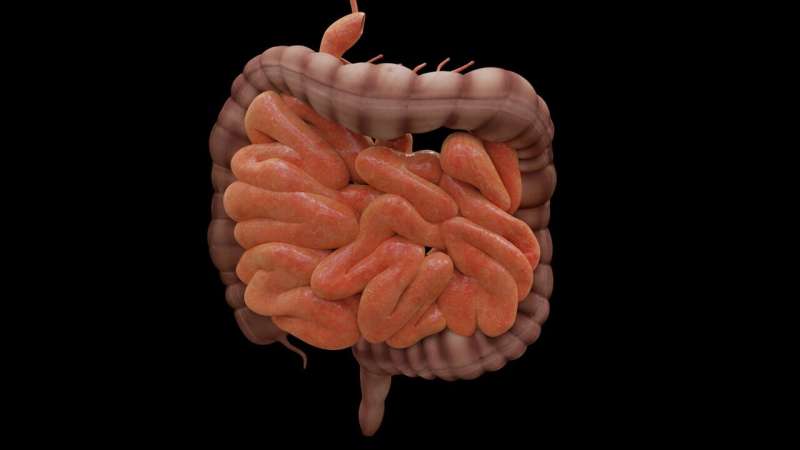This article has been reviewed according to Science X's editorial process and policies. Editors have highlighted the following attributes while ensuring the content's credibility:
fact-checked
peer-reviewed publication
trusted source
proofread
AI bowel cancer test can tell whether patients need chemotherapy

A new artificial intelligence (AI) test to determine the risk of bowel cancers coming back could help patients avoid chemotherapy, according to new research led by the University of Leeds.
The work appears in the Journal of Clinical Oncology.
The test uses an AI algorithm to accurately assess the number of immune cells known as CD3 inside early-stage bowel cancer tumors. Bowel cancer, also known as colorectal cancer, is found anywhere in the large bowel, which includes the colon and rectum. It is one of the most common cancers in the world, with 1.9 million cases diagnosed in 2020.
In the study, the CD3 Score test reliably showed which stage II cancers were most likely to recur within five years of surgery—and this could be used by clinicians to decide which patients may need further treatment such as chemotherapy.
Lead author Dr. Christopher Williams, Cancer Research UK Clinical Trials Research Fellow in the University of Leeds' School of Medicine, said, "This has the potential to be the most important test patients with early-stage bowel cancer ask for. It's fast, accurate and simple, and we hope it will make conversations about chemotherapy after surgery much more straightforward for patients and their doctors.
"Current methods for deciding which patients with early-stage bowel cancer need chemotherapy and which do not are unreliable. Many people receive chemotherapy when they don't need it, and unfortunately, some of the people who are not offered chemotherapy go on to experience cancer recurrence.
"It is very difficult to decide whether people with stage II colon cancer in particular need chemotherapy after their surgery as there is generally a lower risk that this cancer will come back. The assessment method we trialed gave a stronger indication than any feature we currently assess as to whether a stage II cancer might come back.
"This is very useful information for doctors and their patients facing difficult decisions about whether or not to proceed with chemotherapy after surgery."
Previous studies have shown that bowel and rectal tumors with higher numbers of CD3 immune cells are less likely to recur after being removed by surgery. This is because CD3 cells can attack the cancer, helping the body tackle the disease.
"Our study underscores the potential importance of the CD3 Score test to bowel cancer patients, providing a critical insight to physicians in driving chemotherapy options for their patients," said Kandavel Shanmugam, Clinical Research Lead at Roche Tissue Diagnostics in Tucson, Arizona, who collaborated with the researchers at the University of Leeds' School of Medicine.
Researchers in the current study set out to establish whether the number of CD3 cells within tumors could be used to predict the risk of a tumor coming back after surgery.
They examined tissue from 868 bowel tumors at stage II and III to establish the numbers of CD3 cells within the tumors. The AI algorithm developed by the team calculated a "CD3 Score" based on the number of CD3 cells in different areas of the tumor. High risk scores had lower numbers of immune cells, while low risk scores showed increased numbers of immune cells.
Tumors with a high-risk CD3 Score were three times more likely to have come back five years after surgery than those with a low-risk CD3 Score.
Recurrence rates were reduced in both groups when patients underwent chemotherapy, but the study also showed that patients with lower numbers of immune cells were the most likely to benefit from chemotherapy.
These findings can be used by doctors to decide whether a patient needs chemotherapy after bowel cancer surgery.
The CD3 Score test is patented by Roche Diagnostics.
Dr. Williams added, "The CD3 Score test has been rigorously evaluated and found to be reliable when testing was repeated in a second set of patients. The evidence generated by our trial of the usefulness and reliability of the CD3 Score test provides a clear rationale for its adoption by the NHS, and our hope is that it will be made available to patients as soon as possible."
More information: Evaluation of CD3 and CD8 T-cell IHC for prognostication and prediction of benefit from adjuvant chemotherapy in early-stage colorectal cancer within the QUASAR trial, Journal of Clinical Oncology (2024).





















